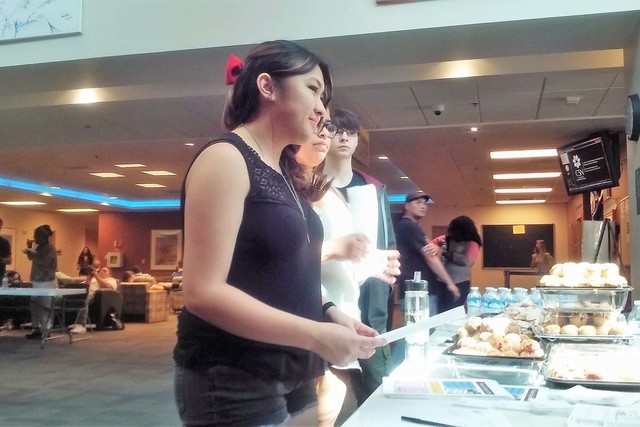Las Vegas’ higher education scene puts a Sin City spin on feminism
Lifelong feminist Mary Riddel recalls her early days on college campuses: the “big deal” of feminism at Michigan in the ‘70s; the popularity of Anti-Apartheid demonstrations; and her days at the University of Colorado in Boulder, where political activist Ward Churchill once presided.
Now a professor of economics and graduate coordinator at UNLV, Riddel said what’s most striking about the campus at 4505 S. Maryland Parkway today is the quiet.
Although she said she’s seen more interest in feminism in the last few years, when it comes to students engaging in on-campus feminist activities, “I cannot recall a single time when I saw a student doing that,” said Riddel, who also serves as co-chairwoman of the UNLV Women’s Council.
She said she’s heard young women describe feminism as “not a good dating strategy.” She suspects that many of her female students at UNLV’s Lee Business School are “afraid to be labeled that way.”
Nor does the Women’s Council command much attention from students. Yet, it advocates for all women on the UNLV campus, putting five committees to work throughout the year on issues ranging from creating lactation stations, events that equip women with pay negotiation skills and last year’s roundtable discussion on the impact of the Affordable Care Act on women, both generally and at UNLV.
The council’s 200 members consist mostly of faculty and professional and classified staff, although graduate students do attend. Funded by the Provost’s office, the group was resurrected about four years ago from the remains of UNLV’s Status of Women Committee.
Its less-than-visibility to students may simply require a better job of getting the word out, Riddel admitted, but she still worries about the state of feminism at UNLV.
‘We’re not all done’
As an economist and a working woman, Riddel sees pay equity as a critical issue.
“We’ve made progress,” she said. “But a lot of these young women think that we’re all done. Well, we’re not all done. We still make — depending on the numbers you look at — 10 to 15 percent less than men for the same job. Over your lifetime, depending on your salary, it can add up to hundreds of thousands of dollars in personal wealth.”
That issue affects not only women, but their families.
Likewise, Sondra Cosgrove, a history professor at the College of Southern Nevada, said her students are generally “of the mindset that feminism won.”
“Usually because they haven’t had enough personal experience,” she said. “It’s more invisible now. They haven’t had experiences where they realize they’re making less money than their male co-workers. Or having someone say something sexist to them.”
Cosgrove is the co-chairwoman of CSN’s Women’s Alliance and chairwoman of its Native American Alliance, and the president of the Las Vegas chapter of the League of Women Voters. She’s seen “traditional activism” among her Bernie Sanders-supporting students, who took to rallies and the Las Vegas convention. Some of her Latina/Latino students work on immigration reform.
But she worries that the prolonged Great Recession has imbued millennials and post-millennials with a fear of taking risks.
The Las Vegas sex trade hasn’t been easy on the feminist cause, or the advancement of women, either. Cosgrove has had strippers in class. In their early 30s, they’ve told Cosgrove, the profession gets grueling — and less profitable. And, for some of Cosgrove’s younger students, clothing and looks win out. A Sin City night on the town doesn’t always include activism.
“There is much more of this idea that women are sexual beings and not really intelligent,” Cosgrove said. As a result, “a lot of times, women don’t think, ‘How am I marketable in other ways?’ ”
Attitudes about women in the valley are “not Stone Age, but Bronze Age,” agreed Riddel.
Hope on the horizon
But a generation’s belief that “feminism has won” offers a backhanded antidote. And, hope.
“They assume they’re going to get the jobs and be paid the same,” Cosgrove said. “Sure, what they run into is kind of a shock. But just assuming you’re going to get something, you will get it. Because you’re going to be confident.”
That’s a big change, even from a few decades ago.
“I think the one thing that makes my generation a little more balanced is we question everything,” observed Raquel Cruz-Juarez, 24 and a Raíz Organizer at Planned Parenthood.
Cruz-Juarez attended both UNLV and CSN, graduating in 2014. As a Planned Parenthood employee, she’s worked with campus groups such as Students United for Reproductive Justice at UNLV.
“I see my mom developing into my feminism because I’m questioning things at home, in a good way,” she added.
Commuter nature affects student body
The commuter nature of Las Vegas’ campuses may also have something to do with the relative quiet.
Students who are older, married and have jobs tend to dominate community college campuses, according to Cosgrove. Some of her students care for aging parents. And several classes operate online, helping students to avoid setting foot on campus.
It’s a student body with little time to attend rallies or panels.
Riddel also sees UNLV as a commuter school. In the business school, the name of the game isn’t feminism, but networking and the process of transforming an education into a well-paid job. That means investment, not in activism, but in Econ Club or the American Marketing Association.
Cosgrove said that the women’s alliance and the League of Women Voters have been working to redefine activism for CSN students. That’s meant asking students to commit to a once-a-month panel or connect with other activists on Facebook, rather than putting in several hours a week at rallies.
“What we’re trying to do is slice it into thinner pieces, so they can see that even though they’re really busy, they can still be engaged,” Cosgrove said.
And social media is transitioning some of the physical presence of the feminist movement on campus into the less-visible realm of the virtual world. That’s where students on Las Vegas’ haphazard, 24/7 schedule can finally become activists.
Finding a feminism for all populations
The relative youth of the UNLV campus itself may also be a factor. According to Anita Tijerina Revilla, associate professor of Gender and Sexuality Studies at UNLV and director of Interdisciplinary Degree Programs and Gender and Sexuality Studies at the College of Liberal Arts, “older universities and communities have a larger visible presentation” of activism because they’ve had many generations to stabilize organizing.
And, she noted, students of color and families of color are changing the face of Las Vegas and its feminism. One requirement: a feminism that works for “all marginalized populations.”
“Most of the activists I’ve worked with are first-generation students,” she added, noting that students of color demanded what are now given campus institutions, such as the Center for Social Justice.
Among her students, Riddel also sees plenty of first-generationers, coming from high schools where standards are lower. Their families sometimes recoil at the thought of debt, narrowing the path to success — engineering for the guys, maybe, and accounting for the girls.
Riddel recalls a Hispanic student whose family was pressuring her to drop out and return to California, take a job as an administrative assistant and take care of her kids.
“She said, ‘I can’t take out any more debt. I’m not going to be able to pay it.’ I said, ‘You know what? This is your only chance to finish this degree, to pay that money back.’… Sometimes, you gotta suck it up and believe in yourself.”
Trading in a job as an administrative assistant for a shot at being a vice president of analytics at Caesars makes $25,000 worth of debt for a degree in economics an “excellent” investment, Riddel said. It’s even more important for women of color, who can “change the face of their family,” creating more opportunities for their kids.
“It’s a cultural sexism I see sometimes here,” she said. “But do I see the activism? No.”
Applying it on campus
For Cruz-Juarez, feminism is multi-layered. It covers not only reproductive justice, but immigration reform, environmental issues, income inequality, and social justice movements such as Black Lives Matter.
“A lot of the students I work with are understanding that these are broader subjects,” she said. “They don’t just apply to campus.”
Meanwhile, faculty and staff are reshaping the face of feminism on Las Vegas college campuses by working to tighten the rules, put processes in place and point out disparities.
Of 18 professors on her floor at the beginning of the summer, Riddel said two were female. A quarter of the women graduating with either undergraduate or graduate degrees in economics are women, she estimated.
She cited the need for female professors to mentor other faculty as well as female professors who can share personal experiences with female students about balancing school versus having a baby.
The Women’s Council is also helping the Provost’s office to define a pay equity review process.
“You get all different answers about how you’re supposed to approach that,” Riddel said. “We want something that’s standardized.”
On the CSN campus, Cosgrove said, the Women’s Alliance helps students connect with tenured faculty to address rules that aren’t being enforced, confidentially. Faculty members guide students through the process or take it up through the chain of command themselves.
“We’re hoping that when they get out in life and run into a problem, the first thing they’re going to say is, ‘I need to find out who’s in charge of the processes,’ ” said Cosgrove, who serves as an advocate in CSN’s Title lX office.
She’s there once or twice every semester, sitting with someone so they don’t feel uncomfortable while explaining their situation to a Title lX officer. It’s usually related to gender.
The most common scenario: a situation involving a female who is senior in the department. The department chair decides to make the junior faculty member lead over her, which is not protocol.
“If you let it pass, it emboldens whoever’s doing it to do more of that stuff,” Cosgrove said. “My perspective is, they need to get shut down right away, and be told, ‘You follow the rules, and if you don’t, you’re going to be in trouble.’ ”
At a table celebrating Women’s Equality Day at CSN’s West Charleston campus on Aug. 30, freshman women weighed in on feminism. Jazmin Gamble said she hasn’t thought about feminist issues just yet.
“I think it’s still important,” chimed in her friend and fellow freshman, Sydney Moral. “In some cases, people still see us as helpless.”
Visit unlv.edu/womenscouncil and csn.edu/womens-alliance.
Find out more
UNLV's Women's Council: unlv.edu/womenscouncil
CSN's Women's Alliance: csn.edu/womens-alliance






























